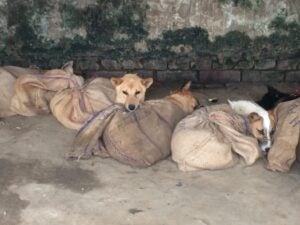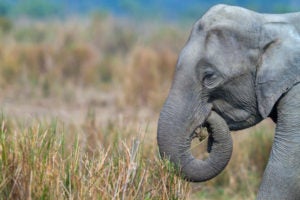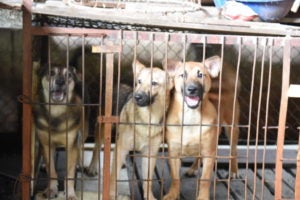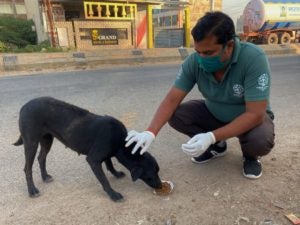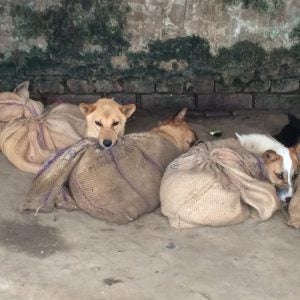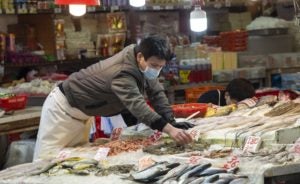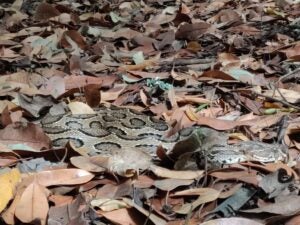
KARNATAKA—Radio telemetry to track snakes, the free distribution of solar lanterns and gum boots in rural Karnataka, along with local community awareness, are being used as part of a unique pilot project to tackle India’s huge snake bite problem. India is the snake bite capital of the world, with newly published research showing 58,000 human deaths every year, and up to a further 200,000 cases of life-changing morbidity such as limb amputations that can have devastating economic impacts on families affected. In addition to the human toll, snake persecution is a real conservation and welfare issue across India that sees many thousands of snakes needlessly killed every year.
Animal protection group Humane Society International/India and conservation initiative The Liana Trust are working together to help agricultural communities live in harmony with the Russell’s viper, among other venomous and non-venomous snakes with whom they share their rural landscape. The viper is the species responsible for the most snake bites in India. Human-snake conflict in India is far more significant than conflict with any other wild species in terms of loss of life, and yet rarely receives the attention that conflict with tigers, leopards, elephants or crocodiles does. Conflict with these mega-fauna account for around 1,000 deaths a year.
Sumanth Bindumadhav, wildlife campaign manager for HSI/India, said: “As snakes are often considered less charismatic than elephants and tigers, they receive relatively little attention in India, and citizens are generally not educated in snake safety. But the truth is there are many more lethal incidents involving snakes and people in India than any other creature, and snake persecution is extremely common, with thousands of snakes a year stoned to death or beaten with sticks and left to slowly die. The astonishing number of human deaths and life-changing injuries also has an enormous socio-economic impact because those most likely to be bitten are the main income earners in agricultural areas who are out working the land. If they lose their life or even a limb and cannot farm, it can mean their children are taken out of school and put to work, or families simply spiral into debt.
“So, our project in Karnataka is life-saving for all concerned, giving rural communities the knowledge and tools they need to live safely alongside these reptiles. We’re finding that people don’t actually wish harm on these snakes, they simply want to know where they are and how they behave so that they can avoid them and go about their business. Radio telemetry of venomous snakes helps us better understand their movements, ecology and behaviour, so that we’ll be able to give local people precise guidance in how to adapt behaviour to best live alongside their reptile neighbours.”
Working with a local community in Karnataka, HSI/India and The Liana Trust spring into action as soon as community members alert them to a Russell’s viper sighting, so that the snake can be retrieved, fitted with a transmitter and released in the same location with the community’s knowledge and support. Twenty four vipers so far are being tracked, allowing the HSI/India and TLT team to collect vital data about this little known snake that will be used to create a bespoke “snake safe” guide for people in the local area. Information such as what time of day they are most active, during what temperatures, and in what habitat, will be collated over a three year period to build a local profile of the Russell’s viper.
As well as field work to better understand the snakes, HSI/India and The Liana Trust are also employing practical measures to immediately help prevent bites, with the distribution of solar lanterns and gum boots. The majority of deaths from snake bites in India are in farmers and labourers who work bare-footed in the fields, or who venture out after dark to turn on the water pump motor to irrigate their land, because electricity in certain areas is only supplied at night. As 56% of India’s population (732 million people) is without indoor sanitation, venturing outside during the night to visit the latrine is also a prime time for snake bites for the whole family.
Community outreach and education also plays a critical part in the program, with local children participating in monthly snake safety lessons where the campaigners use films and slide-shows to teach them how to identify venomous snakes, how to play safe and what action to take if bitten. These are skills the children take back to their families.
Gerry Martin from The Liana Trust said: “Many people assume the area around their house or nearby will be safe and so they often step on a snake at night by accident simply because they can’t see them. By providing each household with a solar lantern, and ankle-high boots for the whole family, a significant proportion of these bites can be prevented. Snakes are a really important part of the local ecosystem, but they are killed in large numbers due mainly to fear and lack of knowledge. Even the Forest Department isn’t provided with proper training and so our project is working with officers to give them the humane snake handling skills they need. Snakes are often demonised in movies, and with the number of bite incidents it’s understandable that people are fearful. We aim to create a model district for snake bite management and mitigation in the state of Karnataka so it can be replicated in other regions as well and reduce human-snake conflict across India.”
Snake Conflict Mitigation Project facts
- HSI/India and TLT have so far distributed 225 solar lanterns and 200 pairs of gum boots to the Karnataka community. In the second half of 2020 street plays and school wall painting projects will be conducted to further promote the message of how to safely live alongside snakes.
- The project began in December 2018, with a pause of several months during COVID-19 lockdown, meaning the project has just over one full year of data so far.
- In 2019, the World Health Organisation launched its strategy for the prevention and control of snake bites, aiming to halve the number of deaths and serious disabilities by 2030.
- Bites by venomous snakes usually kill by shock, paralysis, haemorrhage or acute kidney injury. Contrary to popular belief, attempting to suck out the venom doesn’t work. If bitten, physical restrictions like jewellery should be removed as these cause concentration of venom in one part of the body, increasing the chances of amputation. The limb should be immobilised and immediate medical assistance sought. Noting down symptoms for immediate delivery to a doctor can dramatically decrease treatment times.
- Research suggests that there were 1.2 million snake bite deaths in India during the 20-year period 2000 to 2019.
Download images here
ENDS
Media contacts:
- Shambhavi Tiwari, HSI/India media manager: stiwari@hsi.org
- Wendy Higgins, director of international media: whiggins@hsi.org

